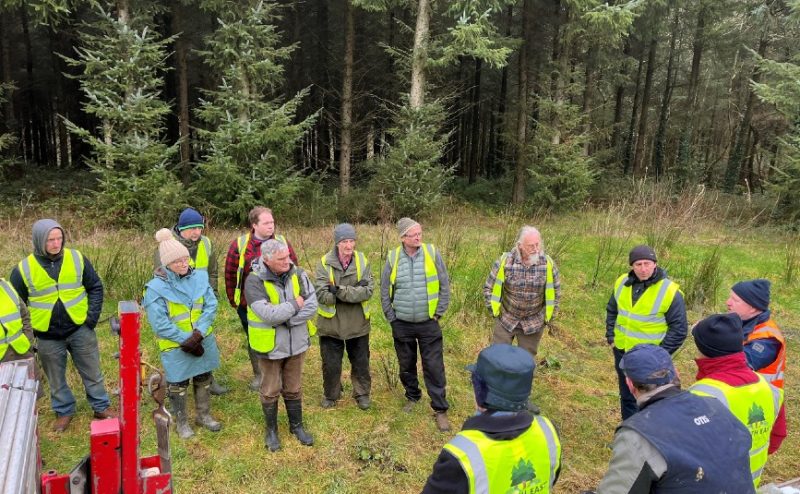
In the wake of Storm Eowyn, which flattened more than 26,000 hectares of Irish woodland in a matter of hours on January 24, the North East Forestry Group (NEFG) has emerged as a lifeline for forest owners reeling from the disaster. Many of those affected had spent decades nurturing their forests – some relying on timber sales to fund retirement, long-term care, or their children’s college fees.
With devastation widespread across the North East, NEFG – a voluntary organisation – has taken swift and coordinated action. Two on-site events have already been held in affected forests to advise owners on salvaging value from storm-damaged timber. Behind the scenes, committee members have been fielding calls from older forest owners, helping to match them with sawmills, biomass producers, and exporters wishing to sell to Scandinavia and Central Europe.
Timber Exports Underway from Dundalk & Warrenpoint
Export activity is already underway, with shipments of storm-damaged timber departing from Dundalk and Warrenpoint ports. Irish sawmills are expanding capacity to accommodate the sudden glut of fallen wood, but at present they are not able to process all the timber available. Although current timber prices remain lower due to additional recovery costs, access to overseas markets has helped prevent further slippage.
To aid forest owners navigating this crisis, NEFG has launched a dedicated Storm Damage Resource Page at northeastforestrygroup.ie.
The NEFG is urging affected forest owners to:
· Apply immediately for a felling licence to apply immediately. The DAFM are fast tracking licence applications for storm damaged plantations.
· Obtain at least three independent quotes before selling timber and to
· Seek free, impartial advice from Teagasc forest advisors
Urgent Call for Compensation Scheme Finalisation
Chair Derek McCabe said “The North East Forestry Group is looking forward to working with the Department of Agriculture, Forest and Marine to get trees replanted but they must fast-track the reconstitution grant. Responsible owners have no choice but to fell standing trees beside windblown trees pre-emptively—due to safety risks—must not be penalised and the whole plot should be included in the reconstitution grant.
“These small sections of standing trees would not survive another moderate storm. Without urgent clarity and funding, replanting won’t happen in time for the next growing season,” McCabe said. “Group membership is the only way many forest owners can access the knowledge and economies of scale they need to recover and rebuild.”
Training and Replanting Support
On 25 June the NEFG along with Pro Silva Ireland will be hosting a half day Workshop for forest owners who wish to look at an option to plant their forest with a more climate resilient tree species. This DAFM funded FT10-CCF replanting workshop will be very worthwhile attending as it will look at an already established plantation.
Looking ahead, NEFG is preparing to launch a Knowledge Transfer Group (KTG) programme in August/September. Participants will attend seven practical and indoor sessions, each supported by a €70 payment. The programme will be led by experienced forester Jim Crowley, formerly of Coillte, who previously managed large-scale storm damage in Donegal.
Topics will include salvage logging, replanting strategies, and long-term woodland resilience. The KTG is open to new and existing forest owners, and NEFG membership costs just €30 annually.